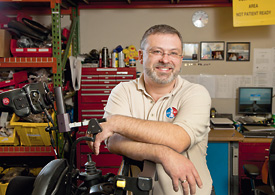Matt Traynor knows a great deal about wheelchairs and the people who rely on them.
As a certified rehab technology supplier for the Wheelchair Seating Service of the U-M Health System Home Care Services Division, Traynor spends his days working with patients who need mobility assistance.
And while Traynor does not take his work home with him, he does take it to the basketball court. As head coach for the Rollin’ Pistons, a wheelchair basketball team, he works with disabled children on all aspects of the game.

Photo by Scott Soderberg, U-M Photo Services.
Traynor got involved with the team at the same time that he began working at Home Care Services, in September 2005.
As a rehab technology supplier, Traynor helps patients who use wheelchairs with proper seating and alternative positioning, and with daily living activities. After consulting with a physical or occupational therapist, Traynor says he must first determine what the patients’ mobility needs are, and then recommend the appropriate manual or power wheelchair. He then works on pricing and insurance information, and completes the final tasks of delivering the wheelchair and helping to set it up.
Variety is what he likes most about his job. “The nice thing … is that you’re always doing something different,” he explains.
All the work to find, fit and deliver the wheelchairs is worth it in the end. “Whether an adult or child, it’s when they get their first wheelchair after they haven’t been able to get around by themselves … that’s the ultimate goal for this job, (for the patients) to be a little more independent in their lives,” Traynor says. “Seeing how the equipment I provide can make an impact on someone’s life, in terms of mobility, positioning and independence, is very rewarding.”
One success story that Traynor will never forget is that of patient Denise, who used a wheelchair all her life. She received a power wheelchair after years of using a manual one, and Traynor remembers her joy: “For 10 years, she was only able to go where someone else was willing to push her … and now she could go where she wanted to. She was independent.”
Traynor wants his players to have that independence, too. He was introduced to the Rollin’ Pistons by an occupational therapist he previously had worked with, and his first interactions with the team were while doing maintenance on their chairs. He began coaching five years ago, and this is his first year as head coach of the varsity team, which includes children from ages 13-18.
The team’s season runs from September to April, and Traynor says he enjoys every week. The best part of coaching, he says, is “meeting kids that have no idea that sports are available” and watching them “out there with a smile on their face, realizing that they’re able to play basketball, just like their friends who are able-bodied.”
The Rollin’ Pistons is a family affair: Traynor’s wife, Kerri, helps out by running the team’s Facebook page, while daughters Ashley and Lyndsey make fliers. Although eldest Brandon is at college, he supports from afar, and the family turns out at the Rollin’ Pistons’ weekend tournaments as often as possible.
The hardest part of coaching is saying goodbye to graduating players, he says, but it is it all worth it in the end. Whether giving disabled children a chance to play basketball or helping patients gain mobility, Traynor says he has one goal: to give people the opportunity to be independent, both on and off the court.
The weekly Spotlight features faculty and staff members at the university. To nominate a candidate, please contact the Record staff at [email protected].

